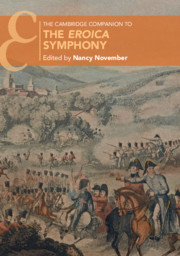Book contents
- The Cambridge Companion to the Eroica Symphony
- Cambridge Companions to Music
- The Cambridge Companion to the Eroica Symphony
- Copyright page
- Contents
- Illustrations
- Musical Examples
- Notes on Contributors
- Eroica Chronology, 1770–2020
- Acknowledgements
- Introduction
- Part I Context and Genesis
- Part II Analytical Approaches
- Part III Reception
- 9 Who is the Hero? The Early Reception of the Eroica
- 10 The Eroica in the Nineteenth and Twentieth Centuries
- 11 Performing, Arranging and Rearranging the Eroica: Then and Now
- 12 The Eroica Endures: Beethoven’s Third Symphony in the Twenty-First Century
- Further Reading
- General Index
10 - The Eroica in the Nineteenth and Twentieth Centuries
from Part III - Reception
Published online by Cambridge University Press: 04 June 2020
- The Cambridge Companion to the Eroica Symphony
- Cambridge Companions to Music
- The Cambridge Companion to the Eroica Symphony
- Copyright page
- Contents
- Illustrations
- Musical Examples
- Notes on Contributors
- Eroica Chronology, 1770–2020
- Acknowledgements
- Introduction
- Part I Context and Genesis
- Part II Analytical Approaches
- Part III Reception
- 9 Who is the Hero? The Early Reception of the Eroica
- 10 The Eroica in the Nineteenth and Twentieth Centuries
- 11 Performing, Arranging and Rearranging the Eroica: Then and Now
- 12 The Eroica Endures: Beethoven’s Third Symphony in the Twenty-First Century
- Further Reading
- General Index
Summary
For the first one hundred and fifty year of its existence, the Eroica was a mirror of shifting political aspirations and fears. It framed the hopes of the century as well as its disappointments. This chapter discusses the views of Richard Wagner and Hector Berlioz, as well as the opinions of Felix Weingartner and Anton von Webern. Brahms’s connection to the symphony is examined in the context of ideologies of cultural decline at the turn of the century, and the public perception of the Eroica is looked at by examining the analyses of the symphony as presented and popularised in several guidebooks to the symphonic repertoire. Throughout the chapter the connection to Napoleon and the ideals of heroism in politics and the arts functions as a recurring theme.
- Type
- Chapter
- Information
- The Cambridge Companion to the Eroica Symphony , pp. 198 - 220Publisher: Cambridge University PressPrint publication year: 2020

